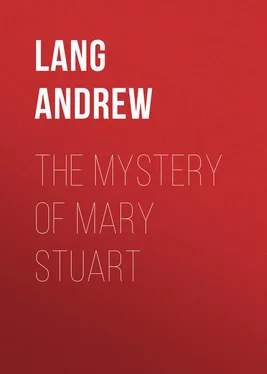Andrew Lang - The Mystery of Mary Stuart
Здесь есть возможность читать онлайн «Andrew Lang - The Mystery of Mary Stuart» — ознакомительный отрывок электронной книги совершенно бесплатно, а после прочтения отрывка купить полную версию. В некоторых случаях можно слушать аудио, скачать через торрент в формате fb2 и присутствует краткое содержание. Жанр: foreign_antique, foreign_prose, на английском языке. Описание произведения, (предисловие) а так же отзывы посетителей доступны на портале библиотеки ЛибКат.
- Название:The Mystery of Mary Stuart
- Автор:
- Жанр:
- Год:неизвестен
- ISBN:нет данных
- Рейтинг книги:4 / 5. Голосов: 1
-
Избранное:Добавить в избранное
- Отзывы:
-
Ваша оценка:
- 80
- 1
- 2
- 3
- 4
- 5
The Mystery of Mary Stuart: краткое содержание, описание и аннотация
Предлагаем к чтению аннотацию, описание, краткое содержание или предисловие (зависит от того, что написал сам автор книги «The Mystery of Mary Stuart»). Если вы не нашли необходимую информацию о книге — напишите в комментариях, мы постараемся отыскать её.
The Mystery of Mary Stuart — читать онлайн ознакомительный отрывок
Ниже представлен текст книги, разбитый по страницам. Система сохранения места последней прочитанной страницы, позволяет с удобством читать онлайн бесплатно книгу «The Mystery of Mary Stuart», без необходимости каждый раз заново искать на чём Вы остановились. Поставьте закладку, и сможете в любой момент перейти на страницу, на которой закончили чтение.
Интервал:
Закладка:
The foremost person is the Queen, a tall girl of twenty-four, with brown hair, and sidelong eyes of red brown. Such are her sidelong eyes in the Morton portrait; such she bequeathed to her great-great-grandson, James, ‘the King over the Water.’ She was half French in temper, one of the proud bold Guises, by her mother’s side; and if not beautiful, she was so beguiling that Elizabeth recognised her magic even in the reports of her enemies. [5] Among the mysteries which surround Mary, we should not reckon the colour of her hair! Just after her flight into England, her gaoler, at Carlisle, told Cecil that in Mary Seton the Queen had ‘the finest busker of a woman’s hair to be seen in any country. Yesterday and this day she did set such a curled hair upon the Queen, that was said to be a perewyke, that showed very delicately, and every other day she hath a new device of head dressing that setteth forth a woman gaily well.’ Henceforth Mary varied the colour of her ‘perewykes.’ She had worn them earlier, but she wore them, at least at her first coming into England, for the good reason that, in her flight from Langside, she had her head shaved, probably for purposes of disguise. So we learn from Nau, her secretary. Mary was flying, in fact, as we elsewhere learn, from the fear of the fiery death at the stake, the punishment of husband-murder. Then, and then only, her nerve broke down, like that of James VIII. at Montrose; of Prince Charles after Culloden; of James VII. when he should have ridden with Dundee to the North and headed the clans.
‘This lady and Princess is a notable woman,’ said Knollys; ‘she showeth a disposition to speak much, to be bold, to be pleasant, and to be very familiar. She showeth a great desire to be avenged of her enemies, she showeth a readiness to expose herself to all perils in hope of victory, she delighteth much to hear of hardiness and valiance, commending by name all approved hardy men of her country, although they be her enemies, and concealeth no cowardice even in her friends.’
There was something ‘divine,’ Elizabeth said, in the face and manner which won the hearts of her gaolers in Loch Leven and in England. ‘Heaven bless that sweet face!’ cried the people in the streets as the Queen rode by, or swept along with the long train, the ‘targetted tails’ and ‘stinking pride of women,’ that Knox denounced.
She was gay, as when Randolph met her, in no more state than a burgess’s wife might use, in the little house of St. Andrews, hard by the desecrated Cathedral. She could be madly mirthful, dancing, or walking the black midnight streets of Edinburgh, masked, in male apparel, or flitting ‘in homely attire,’ said her enemies, about the Market Cross in Stirling. She loved, at sea, ‘to handle the boisterous cables,’ as Buchanan tells. Pursuing her brother, Moray, on a day of storm, or hard on the doomed Huntly’s track among the hills and morasses of the North; or galloping through the red bracken of the October moors, and the hills of the robbers, to Hermitage; her energy outwore the picked warriors in her company. At other times, in a fascinating languor, she would lie long abed, receiving company in the French fashion, waited on by her Maries, whose four names ‘are four sweet symphonies,’ Mary Seton and Mary Beaton, Mary Fleming and Mary Livingstone. To the Council Board she would bring her woman’s work, embroidery of silk and gold. She was fabled to have carried pistols at her saddle-bow in war, and she excelled in matches of archery and pall-mall.
Her costumes, when she would be queenly, have left their mark on the memory of men: the ruff from which rose the snowy neck; the brocaded bodice, with puffed and jewelled sleeves and stomacher; the diamonds, gifts of Henri II. or of Diane; the rich pearls that became the spoil of Elizabeth; the brooches enamelled with sacred scenes, or scenes from fable. Many of her jewels – the ruby tortoise given by Riccio; the enamel of the mouse and the ensnared lioness, passed by Lethington as a token into her dungeon of Loch Leven; the diamonds bequeathed by her to one whom she might not name; the red enamelled wedding-ring, the gift of Darnley; the diamond worn in her bosom, the betrothal present of Norfolk – are, to our fancy, like the fabled star-ruby of Helen of Troy, that dripped with blood-gouts which vanished as they fell. Riccio, Darnley, Lethington, Norfolk, the donors of these jewels, they were all to die for her, as Bothwell, too, was to perish, the giver of the diamond carried by Paris, the recipient of the black betrothal ring enamelled with bones and tears. ‘Her feet go down to death,’ her feet that were so light in the dance, ‘her steps take hold on hell… Her lips drop as an honeycomb, and her mouth is smoother than oil. But her end is bitter as wormwood, sharp as a two-edged sword.’ The lips that dropped as honeycomb, the laughing mouth, could wildly threaten, and vainly rage or beseech, when she was entrapped at Carberry; or could waken pity in the sternest Puritan when, half-clad, her bosom bare, her loose hair flowing, she wailed from her window to the crowd of hostile Edinburgh.
She was of a high impatient spirit: we seem to recognise her in an anecdote told by the Black Laird of Ormistoun, one of Darnley’s murderers, in prison before his execution. He had been warned by his brother, in a letter, that he was suspected of the crime, and should ‘get some good way to purge himself.’ He showed the letter to Bothwell, who read it, and gave it to Mary. She glanced at it, handed it to Huntly, ‘and thereafter turnit unto me, and turnit her back, and gave ane thring with her shoulder, and passit away, and spake nothing to me.’ But that ‘thring’ spoke much of Mary’s mood, unrepentant, contemptuous, defiant.
Mary’s gratitude was not of the kind proverbial in princes. In September 1571, when the Ridolfi plot collapsed, and Mary’s household was reduced, her sorest grief was for Archibald Beaton, her usher, and little Willie Douglas, who rescued her from Loch Leven. They were to be sent to Scotland, which meant death to both, and she pleaded pitifully for them. To her servants she wrote: ‘I thank God, who has given me strength to endure, and I pray Him to grant you the like grace. To you will your loyalty bring the greatest honour, and whensoever it pleases God to set me free, I will never fail you, but reward you according to my power… Pray God that you be true men and constant, to such He will never deny his grace, and for you, John Gordon and William Douglas, I pray that He will inspire your hearts. I can no more. Live in friendship and holy charity one with another, bearing each other’s imperfections… You, William Douglas, be assured that the life which you hazarded for me shall never be destitute while I have one friend alive.’
In a trifling transaction she writes: ‘Rather would I pay twice over, than injure or suspect any man.’
In the long lament of the letters written during her twenty years of captivity, but a few moods return and repeat themselves, like phrases in a fugue. Vain complaints, vain hopes, vain intrigues with Spain, France, the Pope, the Guises, the English Catholics, succeed each other with futile iteration. But always we hear the note of loyalty even to her humblest servants, of sleepless memory of their sacrifices for her, of unstinting and generous gratitude. Such was the Queen’s ‘natural,’ mon naturel : with this character she faced the world: a lady to live and die for: and many died.
This woman, sensitive, proud, tameless, fierce, and kind, was browbeaten by the implacable Knox: her priests were scourged and pilloried, her creed was outraged every day; herself scolded, preached at, insulted; her every plan thwarted by Elizabeth. Mary had reason enough for tears even before her servant was slain almost in her sight by her witless husband and the merciless Lords. She could be gay, later, dancing and hunting, but it may well be that, after this last and worst of cruel insults, her heart had now become hard as the diamond; and that she was possessed by the evil spirits of loathing, and hatred, and longing for revenge. It had not been a hard heart, but a tender; capable of sorrow for slaves at the galley oars. After her child’s birth, when she was holiday-making at Alloa, according to Buchanan, with Bothwell and his gang of pirates, she wrote to the Laird of Abercairnie, bidding him be merciful to a poor woman and her ‘company of puir bairnis’ whom he had evicted from their ‘kindly rowme,’ or little croft.
Читать дальшеИнтервал:
Закладка:
Похожие книги на «The Mystery of Mary Stuart»
Представляем Вашему вниманию похожие книги на «The Mystery of Mary Stuart» списком для выбора. Мы отобрали схожую по названию и смыслу литературу в надежде предоставить читателям больше вариантов отыскать новые, интересные, ещё непрочитанные произведения.
Обсуждение, отзывы о книге «The Mystery of Mary Stuart» и просто собственные мнения читателей. Оставьте ваши комментарии, напишите, что Вы думаете о произведении, его смысле или главных героях. Укажите что конкретно понравилось, а что нет, и почему Вы так считаете.












